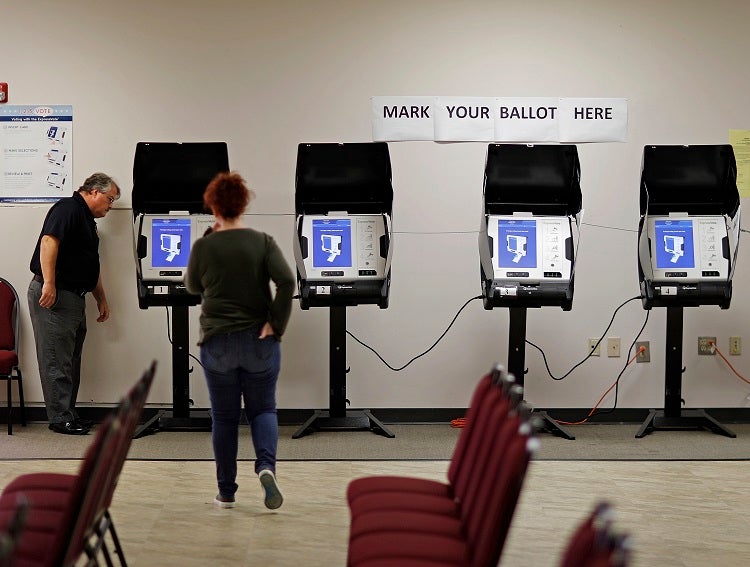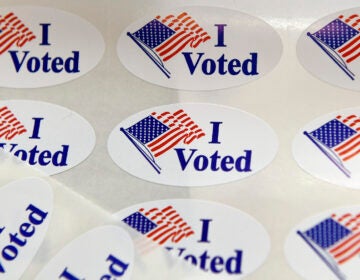Ahead of primaries, N.J. is at early stage of shoring up election security
New Jersey wasn’t one of the 21 states whose electoral systems were targeted by Russian hackers in 2016, but it has weaknesses at both the state and county level.

New Jersey wasn’t one of the 21 states whose electoral systems were targeted by Russian hackers in 2016, but it has weaknesses at both the state and county level. (AP Photo/David Goldman)
This article originally appeared on NJ Spotlight.
—
With less a month to go before this year’s primary elections, New Jersey officials are continuing to fortify state and county election infrastructure, including the addition of more new voting machines with a verifiable paper trail, to ensure the integrity of elections.
Secretary of State Tahesha Way, who oversees elections, told the budget committees of both houses of the Legislature last week that while New Jersey was not one of the 21 states that Russian hackers targeted or scanned in 2016, the state is taking several steps to prevent any unwanted access to its election systems. Her department has also been working with counties to assess the security of their machines and data.
“The soundness of our elections sits at the top of my agenda,” Way told lawmakers, several of whom expressed concern about the safety of the state’s election infrastructure and whether she is getting enough money to fund necessary security upgrades. “The Department of State has been extremely proactive on election security and has become recognized for these election integrity efforts,” Way said.
New Jersey received almost $9.8 million in federal funds through the Help America Vote Act and is matching that with about $500,000, to spend over five years updating and enhancing the security of voting machines and systems. DOS has some leeway in deciding how to spend the money and has outlined how it expects to do so.
New Jersey plans to spend $3 million on cybersecurity, which includes coordinating with the state Office of Homeland Security and Preparedness on election security and helping counties to assess and secure their networks and systems. It has earmarked another $1 million for physical security assessments, including the storage of voting machines.
“We have partnered with local officials to shore up their systems,” Way said. “We have dispatched cyber experts into the counties so they could do thorough risk assessments.”
Robert Giles, director of the state Division of Elections, said that so far, officials have evaluated the machines and other equipment in nine counties and done cybersecurity audits in six. An issue found in one county, for example, involves election systems being in two separate offices and the need to make the network serving both secure. Giles said that’s a $65,000 fix for which the county will get funds.
Stronger cybersecurity
“It’s really off to a good start,” he said. “They are getting a gap analysis and developing a remediation plan. They then apply for funding. Over the next year, we expect to issue some state grants.”
Close to $800,000 is designated for the statewide voter registration system, including the implementation of Automatic Voter Registration at Motor Vehicle Commission agencies, which was signed into law in April 2018. Giles said the state is moving to a two-factor verification system to make the database more secure, as well as adding sensors to monitor the traffic in and out of the system.
The state is also planning to spend $2.5 million on the piloting of new voter-verified paper trail (VVPT) systems, including the purchase of new voting machines in several counties, and to track and secure existing machines. Three counties — Essex, Gloucester and Union — last November piloted new equipment that includes backup paper records of every vote cast. Union, Middlesex and Warren counties have bought new machines. Mercer piloted VVPT in school elections earlier this year. Hunterdon County is also considering switching to the new machines.
But that’s just a fraction of the $64 million that the Brennan Center for Justice estimated it would cost to replace all the state’s machines, some of which are at least 20 years old, with VVPT equipment. Brennan and other groups say New Jersey’s voting system is among the worst in the nation since nearly all votes statewide are currently unverifiable because they are cast on machines without a paper backup. Warren County was the only one in the state that had a paper trail prior to last year. Election officials stress that the older electronic machines are not connected to the internet and would be very difficult to hack.
A better way to check ballots
Still, legislation is pending that would require the phase-in of VVPT machines throughout the state. That would help implement a decade-old law requiring audits of a portion of all ballots cast in the state; these audits can only be done when machine tallies can be checked against paper ballots.
Last fall, audits of the piloted VVPT machines found no discrepancies in the votes tallied by the machines, as compared with counts of the paper backups.
Way said the pilots, which were of different kinds of VVPT machines, were instructive. For instance, Union County learned not to give voters the paper sheet to insert into the voting machine until they were ready to step into the voting booth. It rained last election day and moisture on the paper from voters’ clothes and hands caused some problems in the machines.
“They have the opportunity to assess what is best for their voters,” she said.
The department is also planning to spend $250,000 to develop a statewide election app that would provide voters with a way to check registration and polling place and help dispel any misinformation campaigns that may occur, as happened in 2016. Prior to the last presidential election, for instance, a number of counties released statements countering claims spread by right-wing websites that New Jersey and 15 other states were using voting machines controlled by billionaire George Soros, who was going to fix the results in those states for Democrat Hillary Clinton.
“The majority of issues we dealt with involved misinformation,” said Way.
Trying to ‘stay several steps ahead’
She added that New Jersey and all counties have joined the Elections Infrastructure Information Sharing and Analysis Center set up last year with the backing of the U.S. Department of Homeland Security to coordinate and share information on election security. Way said she also gets classified election briefings from federal officials and participated in an exercise that simulated a cyber election threat and ways to deal with it.
“We have expended countless hours and have further benefited from the wisdom of partners at all levels of government,” said Way. “We have to stay several steps ahead by identifying areas for improvement in cyber incident planning, preparedness, identification and response.”
At least one lawmaker is concerned that the DOS had only spent $171,000 of its election security funds as of April 4. Way noted that the money is available through March 2023 and said that counties have to apply for reimbursement.
Specifically regarding state funding for new VVPT machines, Giles said, “The reality is a lot of counties are not going to get new equipment until the next presidential election.”
WHYY is your source for fact-based, in-depth journalism and information. As a nonprofit organization, we rely on financial support from readers like you. Please give today.




